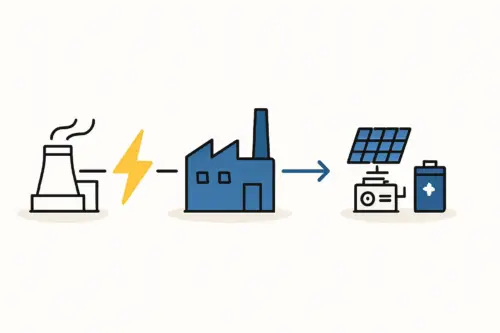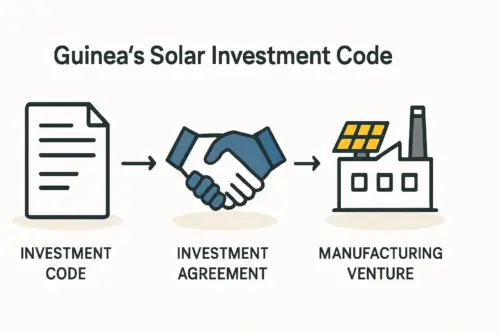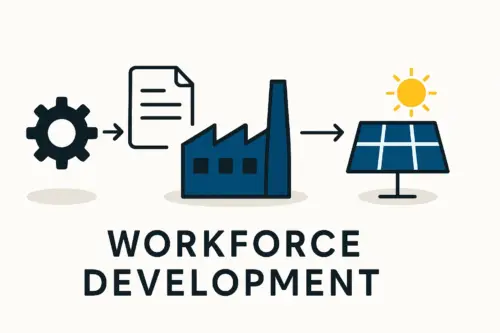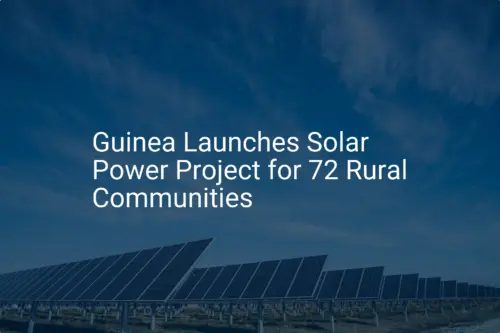For entrepreneurs entering the solar industry, the primary challenge is often not production, but finding a stable, high-volume customer base. In many markets, this means competing for residential or commercial rooftop projects. A more direct and scalable opportunity, however, exists in industrial sectors where energy demand is both immense and expensive to satisfy.
The West African nation of Guinea provides a compelling case in point. Its world-class mining industry operates with a major handicap: an unreliable national grid that forces a costly dependence on diesel generators. This single pain point creates powerful, concentrated demand for an alternative—one that a local solar module manufacturer is uniquely positioned to fulfill.
The Energy Challenge in Guinea’s Economic Engine
Guinea’s economy is driven by its mineral wealth. As the world’s second-largest producer of bauxite, the primary ore for aluminum, the country holds over a quarter of the globe’s known reserves. This sector accounts for approximately 35% of the nation’s GDP and over 95% of its exports. Projects like the massive Simandou iron ore mine promise to expand this industrial footprint even further.
However, this economic engine runs on an expensive and unsustainable fuel source. The country’s grid infrastructure often cannot meet the consistent, heavy power loads required for mining operations, forcing companies to rely almost exclusively on captive diesel power generation.
This reliance on diesel comes at a substantial cost. Electricity from generators in remote mining locations typically ranges from US$0.25 to US$0.40 per kilowatt-hour (kWh). These high operational expenses directly impact profitability, giving mining operators a strong incentive to seek more cost-effective energy solutions.
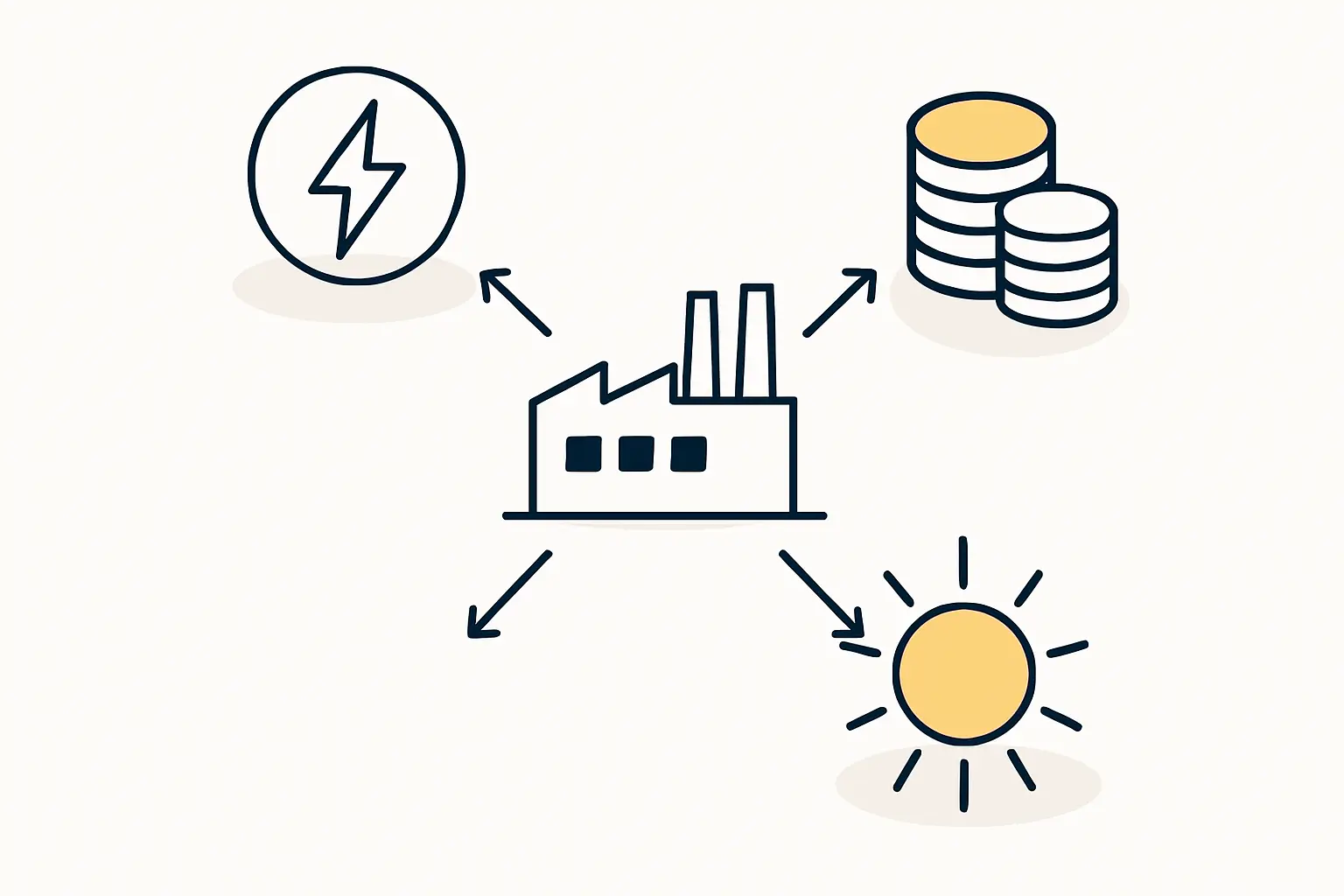
Solar Power: A Strategic Solution for Mining Operations
Guinea’s geography offers a clear alternative. With high solar irradiation levels averaging between 4.8 and 6.0 kWh/m²/day, the country is an ideal location for photovoltaic power generation. For the mining sector, solar energy is not merely an environmental choice but a strategic financial decision.
The key advantages include:
-
Drastic Cost Reduction: Solar power offers a significantly lower levelized cost of energy (LCOE) compared to diesel, especially over the 25-year-plus lifespan of a solar plant. This transition can transform a major operational expense into a predictable, low-cost utility.
-
Energy Independence and Stability: On-site solar and solar-hybrid systems provide a reliable power source, insulating operations from grid failures and volatile diesel fuel prices.
Ready to make big Profits?
The solar Industry is Booming
WE HELP NEWCOMERS to the solar industry start their own solar module production line. Customers can make BIG PROFITS by selling modules and finding investors, without wasting money and time on things they don't need!
-
Meeting Decarbonization Mandates: Global pressure is increasing on industrial sectors, including mining, to reduce their carbon footprint. Adopting solar power allows international mining corporations to meet ESG (Environmental, Social, and Governance) targets and maintain their social license to operate.
This trend is already taking hold. The 30 MW solar-plus-storage project developed by Aggreko for a major bauxite mine is a clear proof of concept, demonstrating the viability and financial appeal of solar power for Guinea’s heavy industry.

The Compelling Case for Local Solar Module Manufacturing
While importing solar modules is an option, establishing a local manufacturing facility in Guinea offers a distinct and powerful competitive advantage. The primary driver for this is Guinea’s Local Content Policy, established in 2018.
This government mandate requires mining companies to prioritize the procurement of goods and services from local suppliers. For a new solar module factory, this policy effectively creates a protected market. Mining companies seeking to build large-scale solar plants would be strongly incentivized, and in many cases required, to source their modules from a domestic producer.

Beyond this regulatory advantage, a local solar module manufacturing business offers other compelling benefits:
-
Secured Offtake: The mining sector provides a pool of ideal “anchor clients.” Securing a single large order from a mining company can provide the revenue certainty needed to justify the initial investment in a factory.
-
Reduced Logistical Complexity: Manufacturing in-country eliminates international shipping costs, import tariffs, and potential supply chain disruptions, resulting in faster delivery times and lower overall project costs.
-
Economic Alignment: A local factory creates skilled jobs and supports the national economy, aligning the business with the development goals of the Guinean government.
A Blueprint for a Successful Market Entry
For an entrepreneur or investor, targeting Guinea’s mining sector provides a focused, de-risked market entry strategy. The approach isn’t speculative; it’s based on solving a clear and costly problem for a specific group of customers.
Based on experience from J.v.G. Technology GmbH turnkey projects, a logical pathway becomes clear:
-
Secure an Anchor Client: The initial focus should be on building relationships with one or two major mining operators to secure a preliminary offtake agreement. This commitment forms the commercial foundation for the venture.
-
Plan the Production Facility: With a clear demand profile, the next step is to define the investment requirements for a suitably sized factory. A 20–50 MW facility is often a practical starting point, sufficient to supply initial projects without excessive capital expenditure.
-
Implement a Turnkey Solution: A turnkey production line provides the most efficient path to becoming operational. This approach ensures that all machinery is integrated, processes are optimized, and staff is trained, allowing the business to begin production within a predictable timeframe, often under a year.
This model of serving industrial clients has proven successful in other African markets. The experience of entrepreneurs like Julius Etim in Nigeria, who established a local factory to supply the industrial sector, demonstrates the viability of this focused strategy.
Frequently Asked Questions (FAQ)
What is the typical size of a starter factory for this market?
A starter factory with an annual production capacity of 20 to 50 megawatts (MW) is well-suited for this market. Such a facility can be operated by a lean team of 25–35 employees and is large enough to supply utility-scale projects for a single mining operation while remaining a manageable initial investment.
Are mining companies genuinely open to procuring from a new, local supplier?
Yes, for two main reasons. First, the Local Content Policy provides a strong regulatory incentive. Second, a local supplier offers significant logistical and cost advantages. Provided the modules meet international quality standards and certifications, mining operators have a clear business case for sourcing locally.
How does the Local Content Policy directly benefit a new solar factory?
The policy gives a local manufacturer preferential status in mining companies’ procurement processes. This means that when a mining company issues a tender for solar modules, a local bidder has a significant advantage over international competitors, even if pricing is similar.
What are the primary risks to consider?
The main risks include political and economic stability, which are factors in any emerging market investment. Specific to this model, the key challenge is securing the initial offtake agreement with a mining company, which requires strong business development and a credible technical and financial plan.
Conclusion: A Defined Path to a High-Impact Venture
Guinea’s mining sector is more than just a potential market for solar modules; it is a well-defined, high-demand customer base with a compelling reason to buy. The combination of high diesel energy costs, excellent solar resources, and a supportive Local Content Policy creates a uniquely favorable environment for a local solar module manufacturer.
For entrepreneurs looking to enter the solar industry with a clear and defensible strategy, this opportunity significantly reduces market risk. By focusing on solving a major operational problem for a core national industry, a new venture can build a sustainable and impactful business. For those exploring this opportunity, a structured approach to planning is the essential first step toward success.


